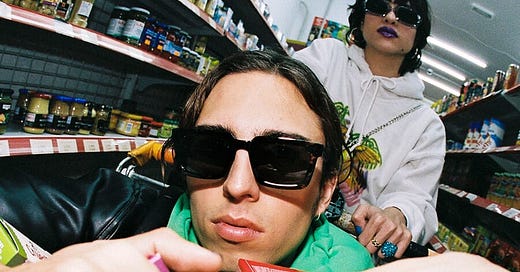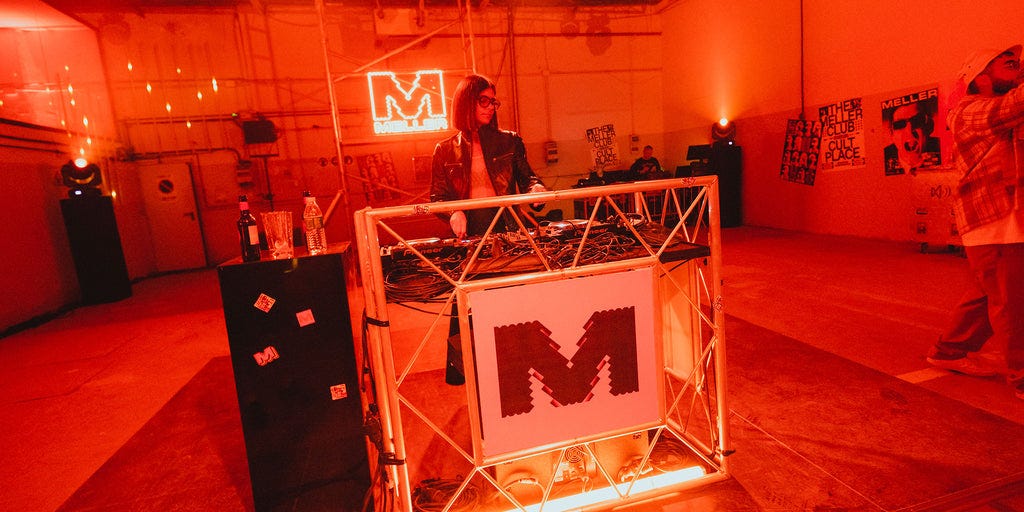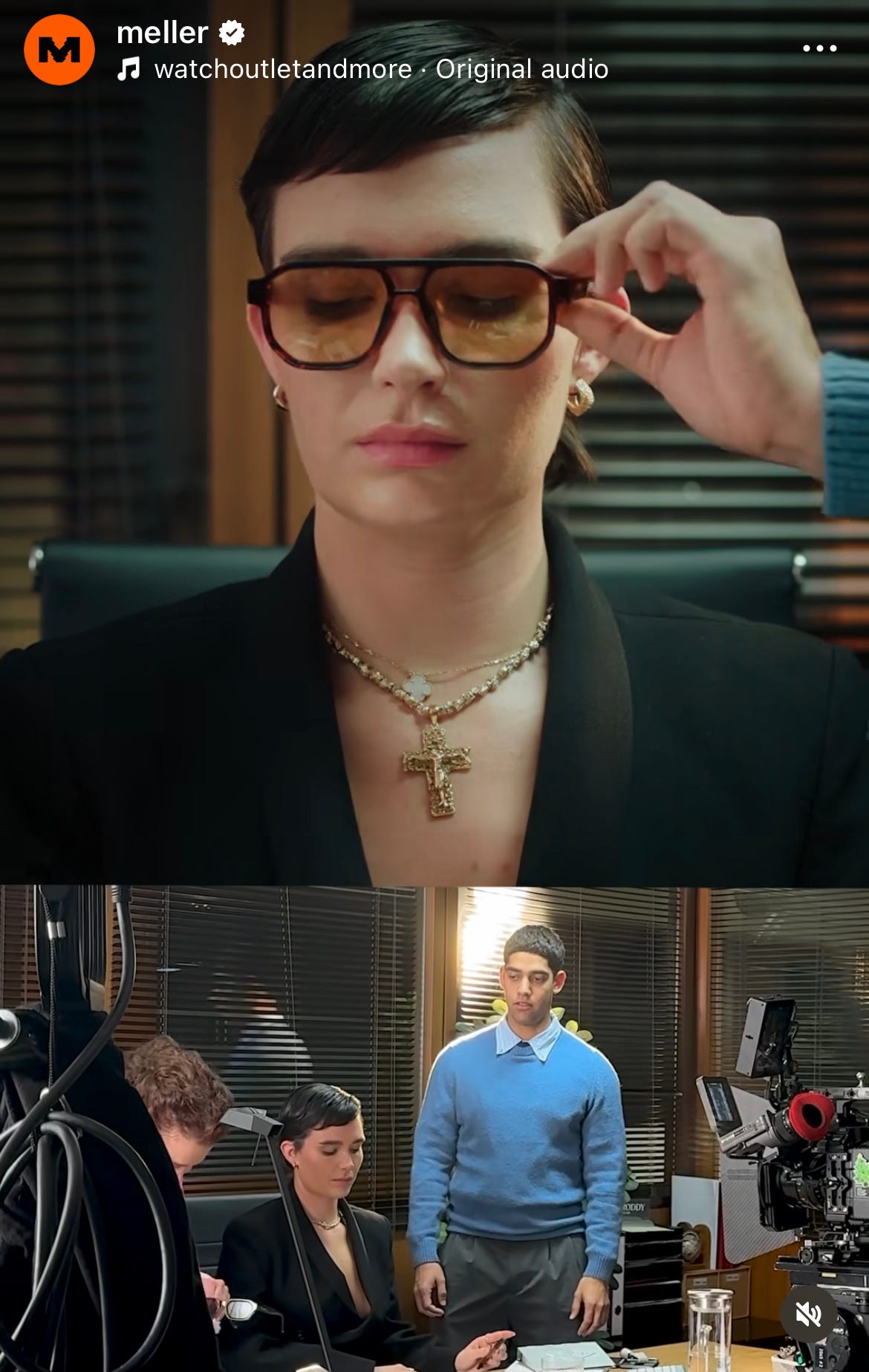How Meller turned €49 Sunglasses into a cultural phenomenon
Plus three early-stage brands on my radar: SULT (electrolytes), Shop ZERO (sustainable fashion marketplace), and Beny Yoghurt (probiotic yoghurt).
Hello!
This is the first newsletter since I decided to revamp my Substack strategy and focus on brand breakdowns of some of the less-talked about case studies so we can all benefit from a more varied diet of inspo - whether you’re building a brand as a founder or marketer.
Starting off strong with Meller: a Barcelona eyewear brand that's been around since 2014, but one I hadn't heard of until a few years ago, when it monopolised my entire friend group's sunglasses preferences, seemingly overnight.
Let’s take a little look at how they did it:
Numbers:
Founded in 2014 in Barcelona
Closed 2022 with a turnover of 11 million euros, a 97% growth compared to the previous year
550k+ Instagram followers
2m+ pairs sold
Business Strategy
Meller solved a simple problem: creative, quality eyewear was either unaffordable (€200+) or felt cheap. They positioned themselves in the sweet spot (€49-79), occupying the gap between fast fashion and luxury brands, giving people something that felt premium but wasn't precious.
The Core Engine
Their strategy is built on three key elements:
Cultural credibility and community participation
Creation of an entertainment ecosystem
Viral purchase mechanism
1️⃣ Cultural Credibility & Community Participation
Meller has embedded itself into the communities where the product naturally plays a role: festivals, club culture, streetwear. They’ve created and amplified experiences that make their brand a natural part of the scene:
Hosting underground Meller club nights
Supporting niche parties like Zsongo Club
Turning product drops into treasure hunts at Sonar Festival
Launching a festival-ready collection with techno-festival Awakenings
Collaborations with niche streetwear brands like Cold Culture
By embedding themselves in these communities, they’ve created a cool-factor that elevates the product beyond its accessible price point.
2️⃣ Entertainment-first content
Meller’s social strategy revolves around episodic storytelling, with each collection serving as a new season in an ongoing series. In the Miss Galaxy campaign, for example, each sunglasses style is a alien-esque character competing in a supernatural talent show.
Rather than using creators as typical brand ambassadors, Meller casts them as key characters within these stories. Their latest campaign with Lissy Roddy is a prime example—she’s not just modeling sunglasses; she’s the protagonist in a series set at Meller HQ.
By weaving distinct characters and plotlines into each collection, Meller keeps their audience engaged and immersed in a larger brand universe that evolves with every campaign and turns their product into something more fun and interesting than just a pair of sunglasses.
3️⃣ Viral Purchasing Mechanism
Meller’s permanent 2-for-1 offer isn’t just a sales tactic—it’s a built-in viral growth strategy. By design, it transforms what could be a solitary purchase into a social experience. Customers are incentivized to share the deal with friends, turning every buyer into a potential brand advocate without the need for formal referral programs.
Beyond driving immediate sales, this strategy creates organic word-of-mouth loops, helping Meller’s products spread naturally within friend circles. It’s simple, scalable, and brilliantly effective.
Lessons for Brands
Find where you naturally belong
Start by mapping where your product already shows up in people’s lives. What cultural moments or communities could you credibly participate in? The key is embedding yourself in spaces where your product already serves a purpose.
Create entertainment, not ads
The goal is to create content engaging enough that people would watch even if they weren’t interested in buying. High production value is optional - so much can be done with an iPhone and a solid concept.
Distribution can be creative
Consider how your product fits into people’s daily lives and relationships. Are there natural moments or incentives that can trigger sharing? How can you integrate your product into conversations or events that people would want to invite others into? The goal is to make word-of-mouth not just something that happens by chance, but something you build into the core of your distribution strategy.
👀 Brand Spotting
New segment alert. Every week I’ll share a roundup of early-stage brands that are doing cool stuff. Lots of you are founders, so I wanted to create a primer on how to build a brand with minimal resources!
SULT
SULT is a new electrolyte brand founded by Hen Porpora (ex Puresport) and fitness influencer Milly Goldsmith. I’m convinced that being great at content is the ultimate unfair advantage for consumer founders - and these two are proof.
They're documenting every step of the journey in a super high-energy and entertaining way - speaking directly to an audience that doesn’t take wellness too seriously. They’ve not even officially launched and they've pulled off a bunch of impressive stunts. We're talking billboard placements, getting in front of Simon Squibb, and landing on James from Brewdog's "startups to watch" list.
>> Follow along here if you want inspo for how to build buzz, credibility and community before your product even hits the shelves.
Shop ZERO
Zero is a curated space for discovering indie brands that meet the highest environmental and ethical standards.
What's interesting? The founders have started with a hyper-local, community-centric approach. They've built a social audience around insider jokes about how people in LA dress, using content formats like "Clothing we can predict you own" and "Things people are wearing in LA", creating a highly targeted audience of LA fashion girls who they convert into customers through regular IRL events. A great reminder of how depth beats breadth when you're building a brand from scratch.
>> Follow along here if you want inspo for community-first brand building.
Beny Yoghurt
Beny is a probiotic yoghurt company that’s been popping up on my FYP for months now.
I love how one of the founders @couchwoman has been documenting the Beny journey from before she even quit her job to go all in on the brand. They’re sharing the unfiltered process of launching a CPG startup and involving their community along every step of the way, from explaining how they are making packaging choices to choosing a manufacturer. Incredibly insightful for anyone who is thinking of launching a brand.
>> Follow along here if you want to go BTS of building a business from day 1.
And that’s a wrap! Would love to hear your thoughts on the new format.
See ya next week,
Miranda








Creative entertainment + clout mechanisms